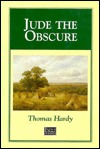The most powerful expression of Hardy's philosophy, and a profound exploration of man's essential loneliness, Jude The Obscure is a great and beautiful book. 'His style touches sublimity.'—T.S. Eliot
Comment: This is another of the books I borrowed and that, despite not always as eager to read as I should, I kept up with because I try to finish all books and be thankful to those who take the time and the gesture to let me read them.
I was familiar with the author's name but this is my debut with his work. Before starting I tried to stay away from reviews but I couldn't escape the notion this would be a sad and depressing book.
This is the story of Jude, a man whose life we follow since he is a child until he's a grown-up. Jude grows up wishing he could be like one of the teachers he meets, someone educated and who studies at the university. However, his path isn't easy and he will see that each step he takes is full of obstacles and realities he can't change or control...
This story is average for me. I think there are two important components in a book that have to be met in order for the story to be successful for me. The plot has to be good and appealing, it has to be well presented and it has to work out well enough for me to enjoy reading it. Although this book's plot is interesting enough and the ideas presented have their interest, I didn't really enjoy the story much. This doesn't mean the story isn't enjoyable in terms of reading, I just mean my own interpretation of it and how much, personally, I can like or not what I'm reading. So, one thing is the plot, another my feelings about it.
The plot is interesting enough. Jude has a lot of bad luck or bad decisions that affect what happens to him. The idea that fate or something almost controls someone's life to the point where every decision and step can be just the prove something had to happen that precise way has its own merits but I think anyone who believes so needs to consider it with a grain of salt.
Jude and those around him go on in life but they discuss philosophically - in our reader's perspective - several aspects of life and why people act a certain way, why some bad or good things happen to a certain type of people and not to others. Many happenings in the story occur because character's think it's expected, because there couldn't be other way for things to develop. This is quite the fatalistic POV but here's the thing, the plot ideas revolve all around this idea. Some people deserve some things, others don't. Karma, fate and social status are everything in this novel.
I can understand the idea and in terms of discussion points is quite interesting. For plot purposes, I'm sure everything was slightly exaggerated and many things happening add up drama because of that.
Did the story had to develop the dramatic, sad way it did? Of course not, but the point is precisely that, we sometimes give too much power and importance to things we could change if only our perception of things, our notion of reality were different. We all have the power to make our lives better but there seems to be something that complicates everything and even more so if we are predisposed to drama or negativity.
The book doesn't end happy. There are many scenes where we surely would wish to hit the characters and make them see reality. This is the part where our personal emotions go in. I can, rationally, understand why the plot moves along the way it does, but it's not something I enjoy, so my perception of this book isn't happy - as intended by the plot and tone of course - but mainly because it's annoying for me to read about things that didn't have to happen that way. Obviously every reader would have different POVs about every scene and chapter.
All in all, the writing, purpose and the intelligence of the author shine through but it gets tiring to read about fatalistic events that happen because of miscommunication and character's manipulation. Although...maybe this is more real than we think, even today.
Grade: 6/10

No comments:
Post a Comment